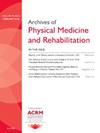Co-development of a Toolkit to Improve Medication Self-management for Persons with Spinal Cord Injury: A Concept Mapping Approach 4350
IF 3.6
2区 医学
Q1 REHABILITATION
Archives of physical medicine and rehabilitation
Pub Date : 2025-04-01
DOI:10.1016/j.apmr.2025.01.034
引用次数: 0
Abstract
Objectives
To explore what content should be included in a medication self-management toolkit for adults with spinal cord injury/dysfunction, as well as considerations for delivery.
Design
Mixed methods, concept mapping study.
Setting
General community across Canada.
Participants
Participants were recruited between October 2022 and October 2023 using purposive and convenience sampling strategies. Participants included 21 adults with spinal cord injury/dysfunction, 12 health care providers, and 11 caregivers from 6 provinces across Canada (Ontario, Alberta, British Columbia, Manitoba, Saskatchewan, Nova Scotia).
Interventions
Not applicable.
Main Outcome Measures
Perspectives on content to include in a medication self-management toolkit and considerations for the delivery of the toolkit.
Results
The final map contained 79 statements, which were organized into 8 clusters: (1) information-sharing and communication; (2) health care provider interactions and involvement; (3) peer and community connections; (4) supports and services for accessing prescription medications and medication information; (5) information on nonprescription medication and medication supplies; (6) safety and lifestyle considerations; (7) general medication information; and (8) practical information and strategies related to medication-taking. All statements were rated highly on importance and feasibility to include in the toolkit. Only 2 statements had a mean rating below neutral (moderate importance or feasibility). Safety and lifestyle considerations was rated as the most important and feasible cluster to include in the toolkit.
Conclusions
In the subsequent phases of this study, the toolkit will be refined through cognitive interviews and a mixed methods pilot evaluation will be conducted to assess the feasibility, acceptability, and appropriateness of the toolkit, as well medication knowledge, self-efficacy, and quality of life. Given the limited tools to help adults with spinal cord injury/dysfunction with managing their medications, there is great potential to better support this population across all areas of medication self-management.
Disclosures
none.
求助全文
约1分钟内获得全文
求助全文
来源期刊
CiteScore
6.20
自引率
4.70%
发文量
495
审稿时长
38 days
期刊介绍:
The Archives of Physical Medicine and Rehabilitation publishes original, peer-reviewed research and clinical reports on important trends and developments in physical medicine and rehabilitation and related fields. This international journal brings researchers and clinicians authoritative information on the therapeutic utilization of physical, behavioral and pharmaceutical agents in providing comprehensive care for individuals with chronic illness and disabilities.
Archives began publication in 1920, publishes monthly, and is the official journal of the American Congress of Rehabilitation Medicine. Its papers are cited more often than any other rehabilitation journal.

 求助内容:
求助内容: 应助结果提醒方式:
应助结果提醒方式:


